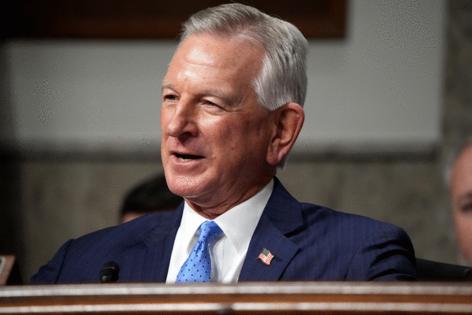Both sides launch ad campaigns over budget vote as bill moves to Senate
Published in Political News
WASHINGTON — Last week’s House vote on a sweeping reconciliation bill encompassing much of Republicans’ legislative agenda is already becoming a focal point in the nascent campaign for control of Congress next year.
Party campaign committees and outside groups have already announced ad campaigns centered on the measure.
The National Republican Congressional Committee announced a digital ad campaign last week targeting 25 vulnerable House Democrats in states such as California, Florida, New York, Ohio and Texas for “voting for the largest U.S. tax hike in generations.”
The targeted lawmakers include all 13 Democrats who represent districts that Donald Trump carried last year.
On the Democratic side, House Majority Forward, the nonprofit arm of the top House Democratic super PAC, “is already planning paid campaigns to hold Republicans accountable for their votes to cut Medicaid and raise prices,” said CJ Warnke, a spokesperson for the group.
The ads are due to run in 25 districts across states such as California, Iowa, Michigan, Missouri, New York, North Carolina, Virginia and Wisconsin.
Meanwhile, American Action Network, a nonprofit with ties to House Republican leadership, released a poll Tuesday showing support for various provisions included in the measure. According to the May 6-8 survey of 1,200 registered voters in 72 targeted congressional districts, 72% favored work requirements for able-bodied adults who receive Medicaid benefits and 68% favored “strengthening Medicaid eligibility integrity.”
The poll found that the measure’s tax provisions were also popular, with 63% saying they favored “ending the federal income tax on tips” and 61% in favor of extending the 2017 tax cuts.
Next stop: Senate
The budget reconciliation bill now moves to the Senate, where a handful of Republican senators facing competitive reelection battles in 2026 will come under intense pressure to support the measure.
“It will be a fistfight next week, starting Monday, with all the Republicans looking at this bill, combining it with the House,” Alabama Sen. Tommy Tuberville said Tuesday on “The Will Cain Show” on Fox News, underscoring the challenge Republicans face.
“We all understand we have to cut spending, but we have to make sure that we don’t hurt people when we do that,” added Tuberville, who announced his 2026 campaign for governor in the same interview.
Louisiana Sen. Bill Cassidy, who faces a difficult Republican primary next year, congratulated Trump and House Republicans on “a big, beautiful step forward.”
“Now the Senate must deliver on a package that meets President Trump’s goal of addressing the debt, keeping the American Dream alive, and unleashing American energy,” he posted on social media.
Texas Sen. John Cornyn, another Republican facing a high-profile primary challenge, also praised the House vote, telling reporters at the Capitol last week, “I think there’s more work to do, and it’s a great start.”
Several Republican senators, however, showed little interest last week in accepting the House product as is, and Senate Majority Leader John Thune can afford to lose only three votes from his conference if he hopes to pass a measure.
North Carolina Sen. Thom Tillis, one of the chamber’s most vulnerable Republicans, signaled that he’d like to see steeper spending cuts than what’s in the House-passed bill.
“We’ve got to look at other things that the House hasn’t really put their foot on the accelerator on,” Tillis said last week.
Even before the bill had cleared the House, the Democratic Senatorial Campaign Committee had begun churning out attacks criticizing the legislation, homing in on potential Medicaid cuts.
In Georgia, a key Senate battleground, Rep. Earl L. “Buddy” Carter, one of several Republicans running or contemplating a challenge to Democratic Sen. Jon Ossoff, highlighted his support for the bill and its tax-reducing elements.
“Make no mistake: if Jon Ossoff opposes this bill in the Senate, he’ll be voting for a HUGE tax increase on Georgia families,’’ Carter posted on social media.
Ossoff topped CQ Roll Call’s recent list of the most vulnerable senators of 2026 as he seeks a second term in a state Trump narrowly carried last year.
But a poll conducted last month by The Atlanta Journal-Constitution found the president’s popularity already slipping with Georgia voters growing wary of his economic agenda. The budget reconciliation bill adopts many of the president’s campaign promises and key agenda items, something Ossoff plans to emphasize during his reelection campaign.
“Georgia Republicans just foolishly initiated the largest Medicaid cuts in history, endangering the health care of hundreds of thousands of Georgians,’’ Ossoff campaign spokesperson Ellie Dougherty said. “Georgians are not going to forget it.”
The National Republican Senatorial Committee, meanwhile, criticized several Democratic House members who are running for Senate next year in the immediate aftermath of their “no” votes. Reps. Haley Stevens of Michigan, Angie Craig of Minnesota and Chris Pappas of New Hampshire “voted against the largest middle class tax cut in history,” the NRSC said.
_____
©2025 CQ-Roll Call, Inc., All Rights Reserved. Visit cqrollcall.com. Distributed by Tribune Content Agency, LLC.

























































Comments